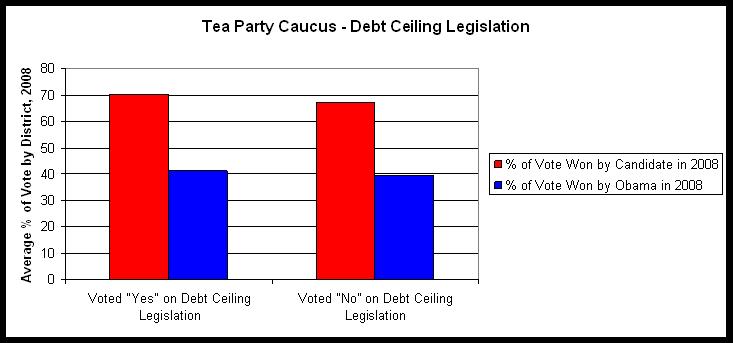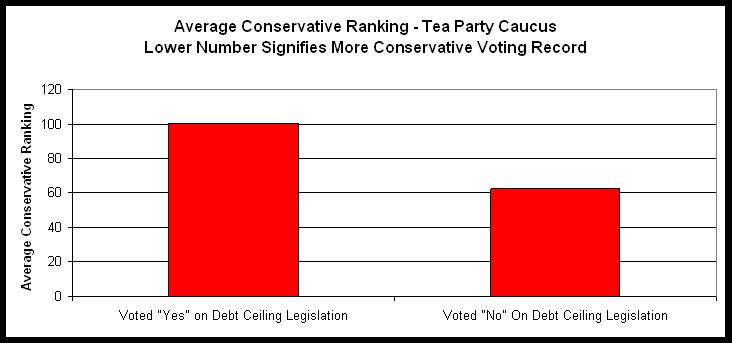With the media coverage predominantly centered on the sense of betrayal felt by many on the Left regarding Obama and the debt deal, it is easy to forget that the debate also divided the Tea Party. In the House, members of the Tea Party caucus split their vote almost evenly, with 32 supporting the debt legislation, and 28 voting against. In an article for the French news agency AFP yesterday, Olivier Knox raised the question whether this split might portend a fracturing of the Tea Party movement heading into the 2012 elections.
As I told Olivier, my answer is that I don’t think it will. First, let’s look at the House Tea Party vote. The split doesn’t seem to reflect differences in district-level factors. Anna Esten calculated the average winning vote percentage and the support for Obama for the Tea Party members in 2010. As you can see, there doesn’t seem to be much difference in the district level totals between those who support the debt legislation, and those who opposed it.
Instead, the determining factor seems to have been the Tea Party representatives’ ideological leanings, as captured in the scoring of their votes. (The data on ideology in the chart below is taken from Simon Jackman’s website). Although most of the Tea Party caucus members are located in the more conservative half of the Republican caucus, those voting “no” on the debt legislation are, as a whole, much more conservative than those who voted yes. Many of them, echoing Bachmann’s viewpoint, were against raising the debt ceiling without passage of a balanced budget amendment. Bachmann, of course, is positioning herself to capture the Tea Party vote in the Republican presidential nominating process. Here’s Esten’s comparison of the “No” and “Yes” House Tea Party votes.
Doesn’t this suggest, then, that the Tea Party may fracture along ideological lines come 2012? Not necessarily. Remember, the debt vote was compromise legislation designed to cobble together enough votes to prevent default. Even its supporters voted yes with one hand holding their nose – that’s why House Democrats’ votes were equally split for and against as well. Those voting in favor essentially chose the lesser of two evils. As Tea Party-backed Senator Rand Paul told Knox in the AFP interview, “I think this is a deal, not a solution.”
In short, the debt vote notwithstanding, the Tea Party caucus remains united on the need to reduce spending, hold down taxes and balance the budget. I expect that they will coalesce behind a single candidate during the nominating process and in the general election. The debt debate will likely recede from public consciousness and 2012 will primarily be a referendum on jobs, government spending and Obama’s handling of the economy.
The more important issue is whether the debt resolution will redound to Obama’s benefit among independent voters. I’ll take that question up when the polling data begins coming in.


